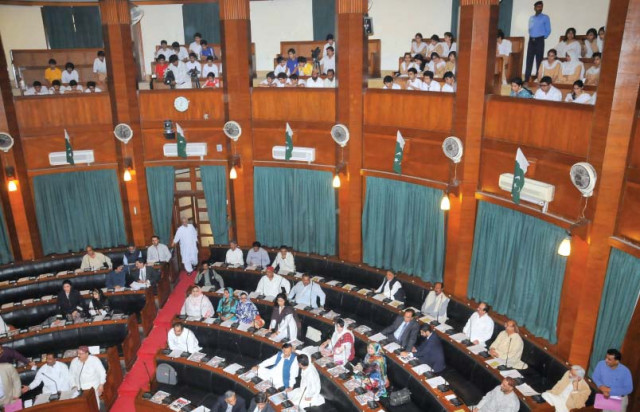Post-colonial parsing: For 170 years, Sindh has ‘sinned’, spelt it wrong
MPAs pass bill to change imperial spelling of province’s name.

History was made in more ways than one, as this was also the first time in five years that the house took on a private bill. PHOTO: EXPRESS/FILE
‘I have sinned’ or ‘Peccavi’ in Latin was the pun attributed to Sir Charles Napier upon his conquest of Sind. That wordplay aside, it has taken this province’s rulers 170 years to cast off an imperial spelling.
On Tuesday, elected representatives passed a private bill correcting the official name of the province from Sind to Sindh. History was made in more ways than one, as this was also the first time in five years that the house took on a private bill.
It was moved by Arif Mustafa Jatoi of the National Peoples Party, who argued that the spelling was Sind in the 1973 Constitution even though this was the version used by the British Empire. The government had realised its error and corrected the spelling in the 1980s, but it stayed on officially.
According to Jatoi, government servants have been saying that since the 1973 law was not changed they had to continue to use “Sind” in all official correspondence, including ordinances, bills, rules and regulations, notifications, orders and legal instructions.
The tide seemed to turn in 2010, said Jatoi, bringing up the 18th Amendment with which the government made drastic changes to the constitution. It changed the names of three provinces, Sind, Baluchistan and North-West Frontier Province. They became Sindh, Khyber-Pakhtunkhwa and Balochistan.
Now Jatoi argues that the province needs to legally do the same. “It is not a political amendment,” he stated. “All the [other] provinces have already made a law.” He wants it to take effect from August 4, 1973 when the constitution was passed during the tenure of Zulfikar Ali Bhutto. Not just ruling party ministers, but Muttahida Qaumi Movement parliamentary leader Syed Sardar Ahmed appreciated his points and supported the amendment.
Jatoi moved another bill, as it was private-member day, to make an amendment to ‘The Sindh Control of Goondas (amendment) Bill 2012’ on controlling disorderly persons commonly known as goondas (criminals).
Jatoi said that the provincial government had passed a Control of Goondas Act in 1952, which needs amendment to control miscreants. The amendment was meant to ensure a uniform policy throughout the province, which was necessary due to the weakening writ of the state, lawlessness and an increasing disregard for the law and common decency.
Law Minister Ayaz Soomro said that this act was repealed when the One Unit was imposed. But Jatoi insisted it was revived later and has been part of the constitution. The speaker referred the matter to a standing committee on law.
Published in The Express Tribune, February 13th, 2013.



















COMMENTS
Comments are moderated and generally will be posted if they are on-topic and not abusive.
For more information, please see our Comments FAQ